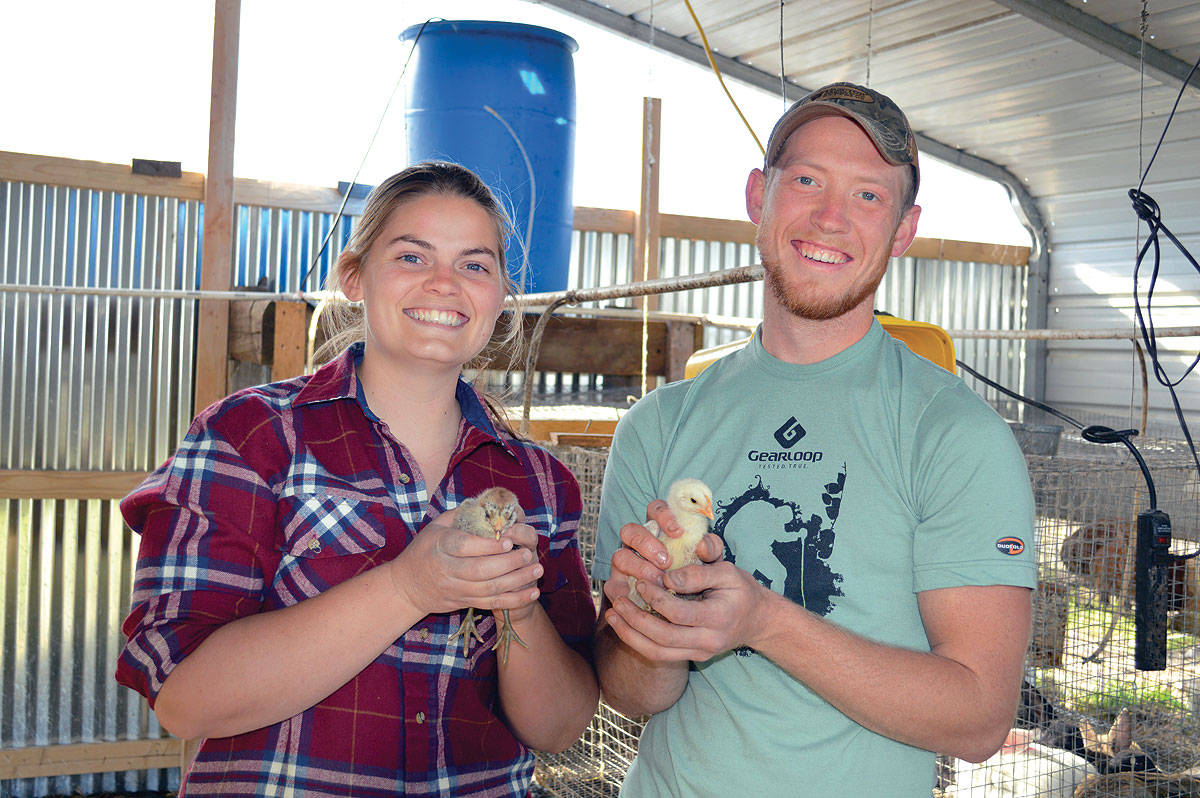
Piney River Valley Sheep is located west of Licking, Mo., literally on the east bank of Big Piney River. Ray and Pam Wallace have lived there almost 40 years and have had several types of farming operations. Ray is a retired union lineman from Intercounty Electric. Pam was the licensing agent for the Department of Revenue in Licking for several years and more recently has been employed at Wal-Mart for the past eight years. In 2006 they purchased their first sheep and they quickly became Pam’s pet project and captured the hearts of their grandchildren, Cole who is 9 years old and Linzie who is 7. Both are very involved with the sheep on a daily basis as well as in the show ring.
Piney River Valley Sheep is fenced and cross-fenced into different pastures with Orchardgrass being the forage of choice. Ray plants wheat in the bottomland, which not only provides pasture, but ideal hay for the winter months. Pam said, “The Dorper sheep are very hardy and self-reliant and will actually paw through snow to get to the grass.”
The Dorper is a South African mutton breed developed in the 1930s from the Dorset Horn and the Blackheaded Persian. It is one of the most fertile of sheep breeds that is hornless with good body length and a short light covering of hair and wool. The Dorper has a long breeding season which is not seasonably limited, therefore, with good management the Dorper ewe can lamb three times in two years. A lambing percentage of 150 percent can be reached under good conditions while in exceptional cases even 180 percent can be attained.
The Wallaces’ ewes were purchased from CMI Dorpers in Jenkins, Mo., Marie Laims is the owner and is well known for having the best breeding stock in the United States. Pam said, “She is very knowledgeable about raising quality sheep and we are delighted with our stock from her place.” The Ram is from 3C Ranches in Ft. Stockton, Texas. This fine animal is from the Kaya bloodline from Australia. Piney River Sheep will have lambs from him this year. Dorper market lambs are known for their good-sized hindquarters and thick tenderloin. Lambs are at market weight, 60 to 80 pounds, in 4 months.
The skin of Dorpers is worth 20 percent of the lamb price and is the most sought after sheepskin in the world. It is marketed under the name of Cape Glovers.
Pam remarked, “Raising sheep and becoming a shepherd has been one of the most satisfying jobs I have ever attempted. The sheep are so calm and peaceful. It is such a pleasure to be around them.” Most farming operations are stressful and farmers go on vacations to relax. Pam said when she gets home from work she goes to the sheep pen. That is her happy place.
Lambing has not presented any major problems as the ewes have a safe, dry place to have their babies. Pam said, “When they have twins we segregate the mother and her babies for a couple of days so they can both nurse, but when they have triplets we separate them a little longer because if one baby misses even one meal it becomes weak and is likely to get pushed aside and will die.” She further stated that when they have a still born lamb she keeps it for a few days in the event that another ewe might have too many to successfully raise and by rubbing the new lamb with the dead lamb, the ewe will identify the scent and accept the substitute baby with no problem.
Lambs have their tails docked during the first week of life and are vaccinated with CDT Tetnus to prevent bloody scours and over eating disease. Pam explained, “Sheep are mainly foragers and do not require much grain except in very cold weather for extra energy and body heat. You have to watch their feet. If they eat too much grain you have to trim their hooves.” Pastures are rotated to cut down on parasites.
Lambs can be marketed any time of year but they bring more per pound from January through April, which takes advantage of the Muslim holidays.
Linzie has five Spanish Cross Boer nanny goats and shows the best kids at the local fair every year. The rest are sold commercially.
Fair time for the Wallaces is the highlight of the year. Lambs and kids are washed, trimmed and groomed for the local fairs and the whole family stays there for a week taking care of the animals, showing and visiting with friends and neighbors. Linzie and Cole look forward to this fun time and usually take home first place ribbons from the fair as well as a $50 reward from Hammond Feed in Licking for a job well done.
Piney River Valley Sheep have some of the finest registered Dorpers available in the Ozarks. Their quality ewes and rams are sold as breeding stock and show animals. In the future they hope to support and encourage not only their grandchildren, but all youth in the area by having show and grooming workshops for 4-H and FFA.
When buyers come to Piney River Valley Sheep to purchase breeding stock, Pam makes it clear that she doesn’t negotiate. In other words, she won’t come down on her prices but she does give “bonuses.” She will give you more than you bargained for and she has a host of satisfied buyers.







